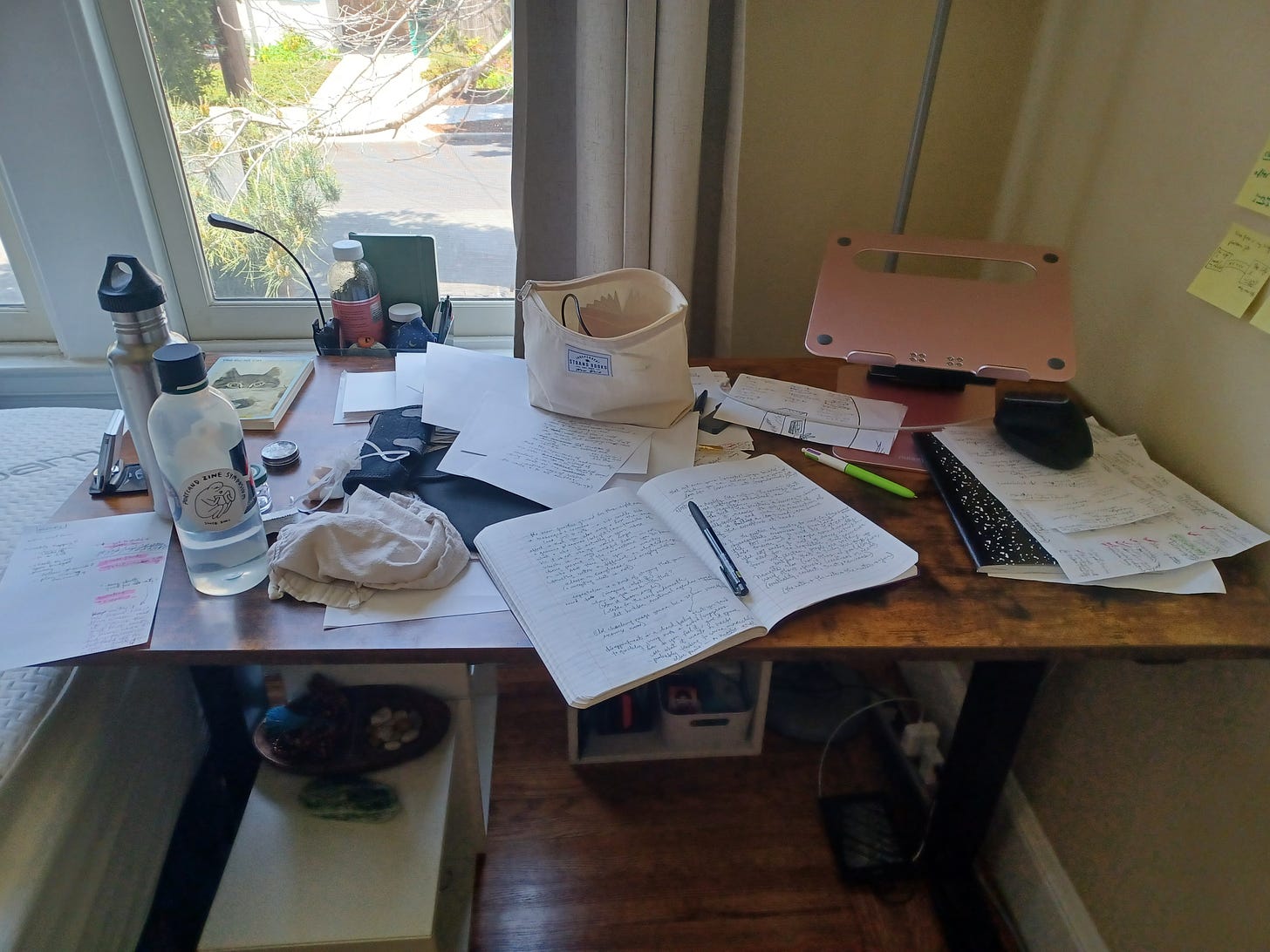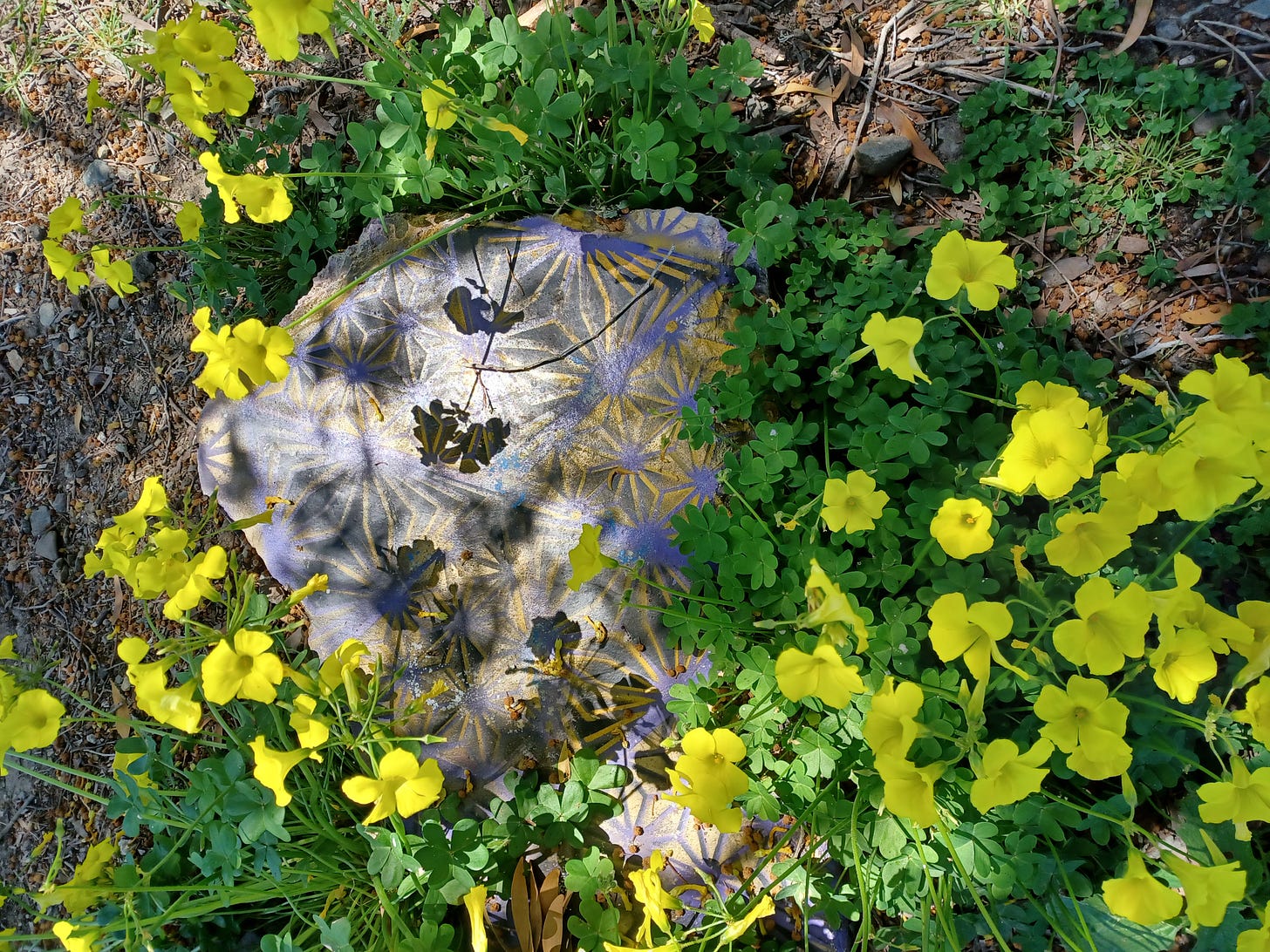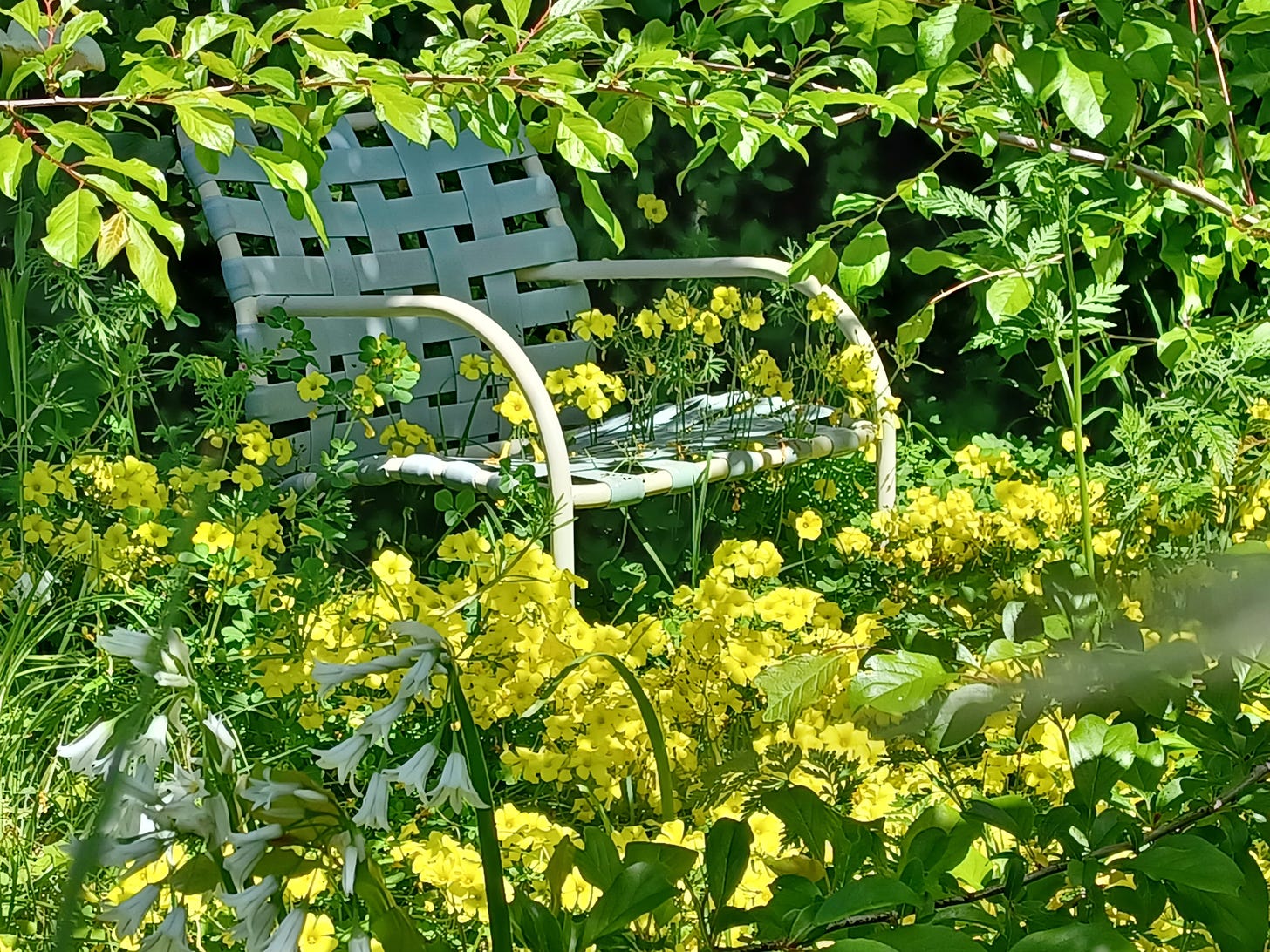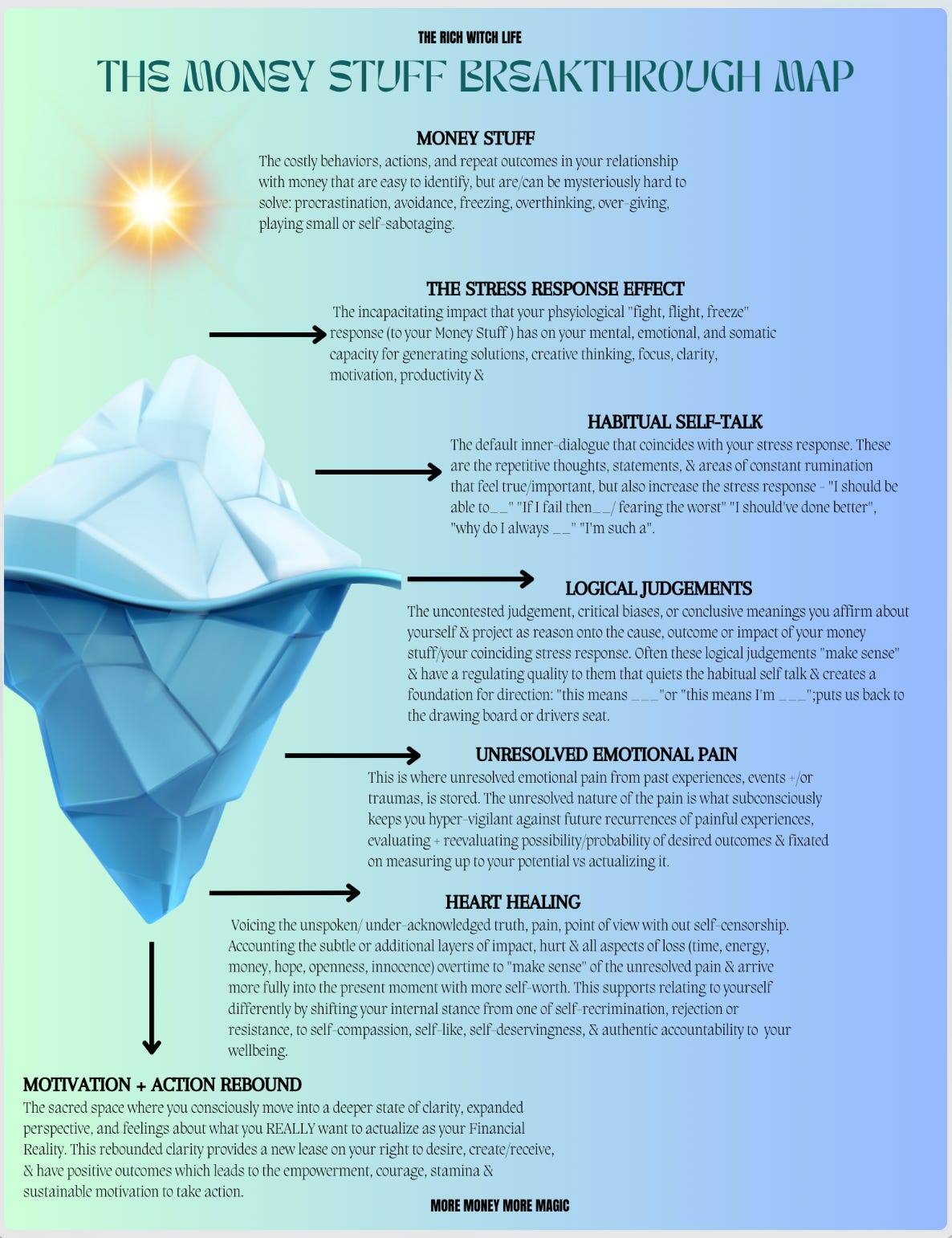No-Nothing Days
On honoring rest and recovery days as integral to life rather than as breaks from life
Welcome to Wandering Grace. I will be sharing essays exploring the themes of place and (be)longing every other Sunday, and bonus snapshots from the road on Sundays in-between those. Read more about the project here.
Last week’s bonus essay (which went out to everyone) was a comic from the archives about Packing Up Home. The essay on ‘baggage around baggage’ is forthcoming, but first we must report what happened beforehand…
I call them no-nothing days.
I’ve been trying to schedule them regularly into my weeks — though they sometimes force themselves in, of their own accord and on their own schedule, regardless of my plans.
The feeling is listlessness — both in the colloquial sense of the term (impassive, lethargic, sluggish) and in the literal sense of the word (the intentional absence of the to-do lists scribbled on scrap paper that so order the rest of my days).
The key is to have nothing scheduled on the calendar: no expectations of me from anyone outside of me, nor even any expectations of myself from myself.
Right now, in this season of my life, I need the total blankness of a blank slate of a blank day all to myself to feel myself again.1
***
In the Wandering Grace editorial calendar of essays, I am tempted to skip over my time at my friend Alisha’s in Albany, CA even though I spend a bodily full five days here.
It ends up being a recovery week, and “nothing happens” during this week. The slowness of the weekend at Jenn’s, the hours sitting and staring at the ocean were not enough…or rather, all of that has been enough to usher me into this — another fully stretch of days where my mind is on fire and I write pages and pages ranting2 about community and sorting through my feelings about cults and trying to reacquaint myself with my own mindbody’s pace after the pace of the Asian Diaspora Jam experience that I’ve just been through. Quick and slow. Way-slow way as a counterbalance to the too-quick quickness of the world.
All of this “pre”writing, all of this foundation, all of this scribbling in notebooks with a meta note in the corner that just says “It’s like I forgot that writing is hard >_<“…will eventually become what you read months later as “On Circles” and “Speeding Towards Trust.”
It’s tempting to skip over the prewriting because you’ve already eaten the fruits of this labor, and isn’t that what counts?

***
My no-nothing days aren’t aesthetic like The Cottage Fairy’s gentle days captured cinematically on YouTube, although I deeply resonate with her attempts at legitimizing — for herself and for the world — a slower pace and the deeper presence and attentions that this way of living allows for.
I am certainly not baking pies or making cute dried flower crafts on my no-nothing days.
My no-nothing days look more like:
sitting on my bed and spacing out after a conflict with my partner.
sitting at the ocean for a couple hours with a little voice in my head telling me at least this is better than staying at home and staring at the walls.
quilting while listening to podcasts about Palestine and feeling shame about not being in the streets for Palestine.
walking to the grocery store and buying eggs to make soy sauce eggs, and pacing back and forth between the self-checkout and the dairy sections while I change my mind again and again about whether buying soy milk as a comfort food right now makes any sense, since I can’t eat cereal due to dental work anyway.3
scrolling through YouTube’s homepage, opening a dozen videos in as many different tabs, hitting play on one to navigate to another browser window to read webcomics instead. (Never watching most of the tabs I just opened.)
sleeping in, getting up to make myself breakfast, which I eat in bed, and then taking another nap.
Some no-nothing days, I lose myself in words (others’ or my own).
Some no-nothing days, my brain fritzes out, and I need silence.
These are the days, and the weeks, and the seasons, and even whole years which I have been trained to hide from my social media feed, to obscure in my dating app profiles, to write out of my own story. When asked “how are you,” my mind seamlessly glides over all of the above as not worthy of attention or articulation. Unimportant and uninteresting.
There is a spectrum, even to the no-nothing’s. Mia Schachter in a workshop about self-consent and self-care, talks about starting to become aware of which activities you turn to for self-soothing, and which restore and replenish your mind-body-social energetic stores.

Schachter’s point is that all of the activites are valid. We are not to judge any of them…but I have a hard time not judging the “self-soothing dysregulation” side of the spectrum. I’m still (un)learning how to stop judging myself for all the things I do “unconsciously” or “unintentionally” to get back into a conscious, regulated, intentional space of agentful choice.
In my culture,4 protagonism has been conflated with external action, interpersonal impact, and tangible productive outcome. We’re trained into seeing ourselves through this lens, by ableist and capitalist worldviews.5
This view valorizes the conscious mind over the instinctive body wisdoms.
This view dismisses everything that comes before the agentful choice.
This view invisibilizes all the prewriting that makes the writing possible,
dishonors the beauty of the survival mechanisms that are foundational to re-regulation.
***
Before I recognized neurodivergence as a factor in my life, I was on a somewhat obsessive learning journey around how to regulate myself enough to be more “functional” again in my day-to-day life. I was mainlining polyvagal webinars and self-studying [trauma in the nervous system] to try and get myself back to “normal” — which for me at the time meant a baseline of consistent productivity that I (frankly) missed. I wanted to be able to trust myself again — and part of that equation was feeling like I could trust my mind-body not to betray me with unscheduled no-nothing days…or figuring out how I could bully (or trick?)(or “masterfully and efficiently re-regulate”) myself back into business.
After my “oh, I might be neurodiverse…” aha moment, and for much of the beginning stages of my autism self-discovery journey, I was being very goal-oriented about it all. I wanted to learn about the autistic nervous system and how it gets overstimulated,6 because I wanted to figure things out (aka figure myself out). There must be better ways to re-regulate than “losing” hours of my day to staring at the wall, I reckoned.
I don’t think I ever framed it to myself as trying to cure myself of my autism, but I did have a conception that: a regulated nervous system was the goal and that dysregulation was bad.7 Therefore, the amount of time that I spent in dysregulation meant that my life was bad, and that I was doing things wrong…or at the very least, that I could be doing things better.
Because dysregulation meant that you can’t be responsive and conscious in your choices. So you should spend as little time as possible in dysregulation. And you should be able to get out of dysregulation as quickly as possible — that being able to do so meant that you were more skilled. And that any of the life / actions / choices that you make during dysregulation don’t count, or at least shouldn’t be fully trusted…
***

But/and: I am autistic.
I spend (and have spent) a lot of time in (dys)regulation — because my mindbody is processing a lot of information all of the time, and my nervous system is sensitive, and so therefore prone to periodic overloads.
It’s true that I am becoming more skilled at moving back and forth between my parasympathetic nervous system and my sympathetic nervous system. But my time in (dys)regulation is still a part of my life. I am unwilling to discount that half my life as unlived and not worthy of the archives.
Furthermore, our world is our world right now. A lot of us are dysregulated at least some of the time.8
“It is no measure of health to be well adjusted to a sick society.”
~J. Krishnamurti9
***
It is April 27th, day 4 of 5 at Alisha’s.
This is what I write in my journals:
This is the portion of the [meltdowns?][recovery periods?] that is the hardest to accept: this listlessness, the eerie calm before the move back into action and doing, this despair or uncertainty (it feels like a certainty—) that because your afternoon is blank, that it means you have no life and no motivation. The emptiness is scary, is vast, feels cruel, unrelenting.
You doubt.
Yes, this fear that “you have no direction” is doubt (which you interpret as worthlessness).10
But actually, you do have direction.
Actually, pause and see:
- the vastness, the emptiness as possibility
- the pause before the restlessness as a sign of desire
- that transitions are just hard, period.
- that you are grasping for: routine, anchor, certainty
- that instead you can drop into yourself, continue asking “what’s next?”
- and that “I don’t know” is an okay answer.
Later:
the water + the water + the water + you
that I sleep til noon
that I can sit and stare at the ocean for hours
that I can sit in silence in this room for hours
that I can accept this is my life today
that often I have meta feelings about this state
— frustration or impatience
— judgment or shame
that I deem it aberrant and something to be changed or to be fixed.
Later that same day, in the same journal:
<3
Transitions out of rest are hard.
But grateful to you for reaching out to others in so many ways — and you have some social stuff lined up for Saturday and a call with [ ] soon.
And it’s okay to feel lonely after a period of chosen solitude. Patience for the time it takes between reaching out and making contact. <3
Rest up, get antsy, trust that the energy to do will arise again.
***
I am starting to trust the arc of my no-nothing days.
At some point, I get itchy for social contact. That itch means the blood is flowing again.
In the timelapse of a caterpillar becoming a butterfly, the time inside the cocoon is the most uneventful. Maybe it’s tempting to skip over that part of the video. Even though inside, magic is happening.
What does it mean to stay witness, even through stillness. To not edit out the boring bits. To trust it all as life.
Money witch Dez Davis has a framework called “The Money Stuff Breakthrough Map”, wherein my aha was around the layer of the iceberg where your brainbody uses ‘logical judgements’ to attempt to make sense of the world in an effort to re-regulate oneself after a stress response. Yo, is this where more than half of my writing and artmaking comes from??? Still processing through what that means for my professional creative life, but/and…insightful.

I end up buying the soy milk. Creature comforts are important some days.
Here I’m referring to early 21st century American culture, mostly…
These worldviews are shaped by patriarchal and colonialist foundations that only counts and values production that serves the expansion of capital for, well, the capitalists. So, for instance, the labor done historically by mostly-women in the domestic sphere became undervalued through its being categorized as unpaid work. Even though this social reproductive labor is foundational for both the workforce to be able to contribute labor to the capitalist machine AND foundational for creating…more workforce. For more on social reproduction, see Ed Whitfield’s essay “On Liberated Zones” (PDF or audio) and Silvia Federici on Re-Enchanting the World (and on witches, lol). On protagonism, see Ursula K LeGuin’s “Carrier Bag Theory of Fiction”.
Overstimulation can happen: from sensory overwhelm; from the beautiful way my brain takes in and keeps in a wide array of information from which to synthesize new insight; from the extra energy it takes to navigate the cognitive dissonance of the oppressive systems that make up our modern world…My brain likes the logic of justice, yet most of our modern world operates in unjust and nonsensical and inelegant ways while weaving elaborate fairy tales as constructed lies about how “the way things are” are fair and sensible and “how things have always worked, actually.” It’s infuriating and mostly doesn’t make sense, but bless my brain, she tries real hard to make the world make sense sometimes…
The language itself, of course, contributes. The [dys] prefix serving as a diss and setting an able-bodied norm, which we can only move away from in deviation.
This conception and view is also informed by the “trauma and the nervous system” stuff I was reading, where the goal is to heal, to recover, to restore back to ‘normal’…do we sense a trend here?
A lot of the world is also the way it is right now because of the ways people are acting, and have acted, over generations, from places of dysregulation…what does it mean to accept that in the Buddhist way of accepting reality as reality, and working from there?
This quote seems to have been inspired by writing that sounds more like: “Is society healthy, that an individual should return to it? Has not society itself helped to make the individual unhealthy? Of course, the unhealthy must be made healthy, that goes without saying; but why should the individual adjust himself to an unhealthy society? If he is healthy, he will not be a part of it. Without first questioning the health of society, what is the good of helping misfits to conform to society?” — via https://kfoundation.org/it-is-no-measure-of-health-to-be-well-adjusted-to-a-profoundly-sick-society/
(Old hat, gremlins — I’m catching onto you.)



